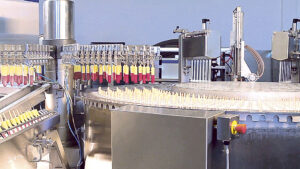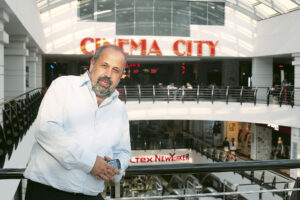Most Greek companies relying on European funding are touristic services suppliers, whether we refer to accommodations, olive oil production or wine testing.
28 years-old Georgia Vassilaki comes from a family who has been producing olive oil for more than six generations. For Georgia, the European funding was a chance to grasp and she took it by starting a 90.000 euros project, half of the sum being supported by a non-refundable European grant. Her family was thus able to buy a processing facility operating with two lines: one, conventional, and the second, allowing olive oil eco-production.
Hundreds of olives trees grow on a 100 ha farm surrounding the manufacturing plant. Vassilaki family is working with over 300 individual owners. Almost 1,500 tons of olive oil is being produced yearly at the plant in Neapoli, Crete (please keep in mind that 1 l requires 4.5 kg olives). Established in 1865, this family business has reached the amount of 1.7 million euros as their exports are taking a European tour, from Germany to France, to Great Britain, Poland and even Romania. According to Georgia, “We honoured very modest supplies in, of 5-10 pallets a year for the last 3-4 years.” Although there are no more than 20 workers in the manufacturing plant, the profit accounts for 20-30% of the turnover.
In Crete, the number of small olive oil producers extends to 100-200, all crowded in only 4 big plants. In terms of selling prices, 1 liter of oil starts at 4.6 euros, topping out 7 euros in Vassilaki business.
Enchanting accommodations
Architect Dimitris Klados built a guest house resembling accommodations in exotic destinations in the Mylopotamos region of Crete. In 2006 the Greek businessman began working on a 350.000 euros project, engaging in the construction of a building accessing 190.000 eurosfunds from an EU program. 8 years later, together with the financial backing of bank loans, the value of the investments amounts to 2 million euros. Today, Klados owns a 10.000 ha property including a guest house and, to the tourists excitement, a zoo and a banana orchard. Employing 18 people of different nationalities, Romanian as well, the guest house can accommodate up to 180 people and one can expect prices between 50 and 1408 euros.
Another EU-funded project is the one developed by a Greek family in the spectacular area of Bali, Rethymno region, where they built three villas. It goes without saying that Russians tourists outnumber any other nationality visiting Greece. “70% of the tourists are Russians” says Michealis, son of the 540,000 euros project developer. In 21 months, this Greek family business succeeded in putting up 3 villas suitable for 3-4 persons available for renting at the price of 170 euros per villa.
The touristic complex opened its doors in spring, and the summer turnover reached 35,000 euros. Unexpectedly, it was not bureaucracy which got in the way of their start-up, but the completion of the application forms calling for a five month preparation period prior to solicitation.
Saridaki Bros holds a Bed and Breakfast complex in the Zaros Heraklion region of Crete named “Eleonas”. He opened it back in 2005 and now boasts 11 villas and 1 tavern, the result of a 440,000 euros investment, half obtained from EU non-refundable funds, and is currently extending to 21 villas for rent from 85 euros per night. In fact the whole amount invested in the villa complex reached out 2 million euros and the expenditure is expected to write off in the next 15 years. Placed in the mountains for intimacy reasons, the villas were built at considerable distance from each other, offering guests leisure and relaxation with an outdoor pool and fitness facilities. In addition, the dishes served at the tavern are made out of products grown in-house. At last, Eleonas extends on a 30.000 sq. m area employing 10 people, among whom a Romanian.
Wine tasting in Greece
47-years-old businessman Stelios Zacharioudakis owns a wine cellar extended over a 2.500 ha sq m area. He is committed to investing 3.5 millions euros in viticulture, out of which 50% should come from EU funding. After clear-cutting a partition of the forest covering the area, in 2009, his vine allowed the production of 100,000 bottles of wine a year, on a 20 ha property. Needless to say Mr. Zacharioudakis resorted to bank loans for co-financing. As a result of the financial crisis, “the interest rate went down from 7.5% to 4.5%”, Mr. Zacharioudakis remarked. Currently the wine cellar stores 130,000 liters of wine and certain varieties are kept in tanks for five to six months while others rest for 12 months. In 2013, Mr. Zacharioudakis earned 300,000 from his wine business, with one third coming from exports. It is worth mentioning that apart from the wine business, Mr. Zacharioudakis also owns a local newspaper bought in 1994 for 100.000 euros.
A solar park on a monastery property
Breaking the conventional monastic regime, the monks form the monastery of Agarathos perform a peculiar range of activities, from cooking to olive oil bottling and maintenance of a solar park. Of Crete’s 30 monasteries, 4 are producing olive oil and Agarathos is one of them. In the last couple of years this monastery suffered quite an impressive number of transformations, such as the arisal of a museum and building an oil bottling plant.
With the purpose of modernizing the oil press and setting an oil bottling plant, the representatives of the monastery invested 650,000 euros back in 2008, half of the amount EU-backed. The results reflected in the production run-up, which got to 60-70 tons, with a ten-fold year-ro-uear increase.
As for the decoration of the museum exhibiting over 300 religious objects, an amount of 190,000 euros was required, confessed father Mioronas upon presenting us their projects. Among these projects one that draws attention is a solar park located on the property of the monastery producing over the last couple of years 349,41 MW for the Greek energy regulatory authority, as the monastery isn’t allowed to use the energy generated.







